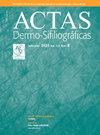[Translated article] Application of the Simplified Psoriasis Index in the Routine Clinical Practice: A Pilot Study
IF 3.8
Q1 DERMATOLOGY
引用次数: 0
Abstract
Background and objective
The Simplified Psoriasis Index (SPI) is a recently validated tool in Spanish that measures psoriasis severity by integrating 3 different spheres: clinical severity (SPI-s), psychosocial impact (SPI-p), and natural history (SPI-i). Our objective was to study the validity and equivalence of this new scale compared to routinely used scales such as the Psoriasis Area and Severity Index, PASI, and the Dermatology Life Quality Index (DLQI).
Materials and methods
This was a cross-sectional and observational study that included 45 patients aged 18–74 years. Demographic data and information associated with psoriasis severity and the patients’ quality of life were collected, using PASI, DLQI, and SPI simultaneously. The correlation of reference scales (PASI and DLQI) with SPI was examined. The degree of agreement between the 2 versions of SPI completed by the physician (proSPI-s) and self-administered by the patient (saSPI-s) was also studied.
Results
The mean age of the study population was 51 years, with a mean psoriasis history of 14.05 years. A strong correlation was found between PASI and proSPI-s (r = 0.89), as well as between DLQI and SPI-p (r = 0.89), with a moderate correlation being reported between PASI and saSPI-s (r = 0.52). The degree of agreement between proSPI-s and saSPI-s was moderate.
Conclusions
These findings represent the initial results of real clinical practice using the validated Spanish version of SPI, making its use truly promising in the routine clinical practice.

[在常规临床实践中应用简化银屑病指数:试点研究。
背景和目的:简化银屑病指数(SPI)是最近在西班牙语中得到验证的一种工具,它综合了三个不同的方面来衡量银屑病的严重程度:临床严重程度(SPI-s)、社会心理影响(SPI-p)和自然病史(SPI-i)。我们的目的是研究这一新量表与常规使用的量表(如银屑病面积和严重程度指数 PASI 和皮肤病生活质量指数 DLQI)相比的有效性和等效性。通过同时使用 PASI、DLQI 和 SPI,收集了人口统计学数据以及与银屑病严重程度和患者生活质量相关的信息。研究了参考量表(PASI 和 DLQI)与 SPI 的相关性。结果:研究对象的平均年龄为 51 岁,平均银屑病病史为 14.05 年。PASI和proSPI-s(r = 0.89)之间以及DLQI和SPI-p(r = 0.89)之间具有很强的相关性,PASI和saSPI-s(r = 0.52)之间具有中等相关性。proSPI-s和saSPI-s之间的相关度为中等。结论:这些研究结果代表了使用经过验证的西班牙版SPI进行实际临床实践的初步结果,使其在常规临床实践中的应用前景十分广阔。
本文章由计算机程序翻译,如有差异,请以英文原文为准。
求助全文
约1分钟内获得全文
求助全文
来源期刊

Actas dermo-sifiliograficas
DERMATOLOGY-
CiteScore
1.90
自引率
9.40%
发文量
473
审稿时长
56 weeks
期刊介绍:
Actas Dermo-Sifiliográficas, publicación Oficial de la Academia Española de Dermatología y Venereología, es una revista de prestigio consolidado. Creada en 1909, es la revista mensual más antigua editada en España.En 2006 entró en Medline, y hoy resulta imprescindible para estar al día sobre la dermatología española y mundial.
 求助内容:
求助内容: 应助结果提醒方式:
应助结果提醒方式:


